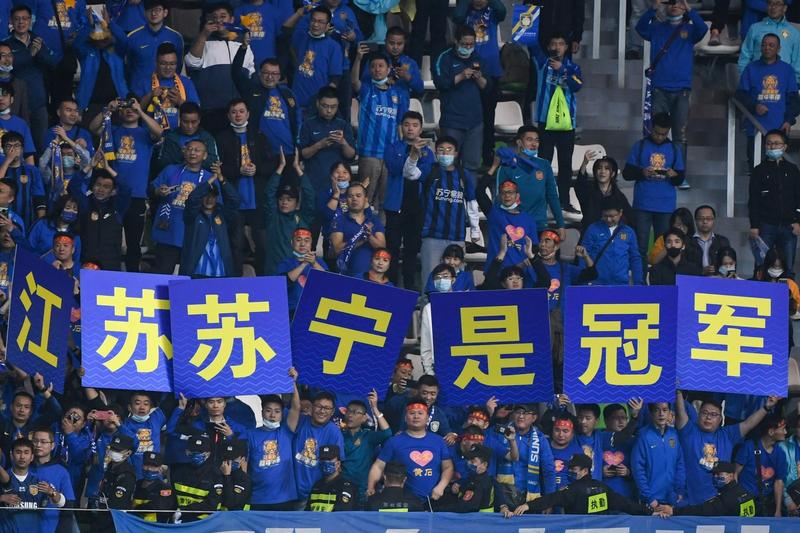 In this Nov 12, 2020 photo, fans hold a banner with the words "Jiangsu Suning is the winner" in Suzhou, Jiangsu province. (PHOTO / XINHUA)
In this Nov 12, 2020 photo, fans hold a banner with the words "Jiangsu Suning is the winner" in Suzhou, Jiangsu province. (PHOTO / XINHUA)
The Chinese Football Association on Monday confirmed new rules that will require the nation's soccer clubs to use more "neutral" names by removing references to their sponsors.
Chinese clubs often have to change their names when a new owner is installed. Dalian Pro, for example, was previously known as Dalian Aerbin and Dalian Yifang
The governing body stressed that teams will only be permitted to feature an administrative region and a nickname of their choosing in their titles. Sponsor or investor names are strictly forbidden, while names, numbers or characters related to the clubs' owners or shareholders have also been banned.
All clubs are required to report their proposed name changes to the CFA by the end of December, with the governing body pledging feedback in the middle of January. Teams who fail to meet the deadline will not be allowed to register for next season.
"The aim is to change clubs' management style, facilitate their marketing, and nurture a healthy soccer culture," read the CFA announcement.
ALSO READ: CFA reins in league's big spenders
"All Chinese Super League, second-tier China League One and third-tier clubs should finish the renaming process before the start of the 2021 season."
Dalian Pro is the only CSL team that currently meets the new requirements, with the remaining 15 clubs all featuring the name of their corporate backers.
Reigning CSL champion Jiangsu Suning, for example, is owned by Suning Group-one of China's largest retailers. Eight-time CSL winner Guangzhou Evergrande is owned by property giant Evergrande Group, while 2018 CSL champion Shanghai SIPG is backed by Shanghai International Port Group (SIPG).
The renaming process promises to be especially painful for clubs who have forged a relatively long history with their sponsors-most notably, Beijing Guo'an and Henan Jianye, who have retained the same names for over two decades.
The CFA, however, hopes the new policy can give Chinese teams the sort of continuity of identity enjoyed by European soccer giants such as Liverpool, Barcelona and Juventus.
Chinese clubs often have to change their names when a new owner is installed. Dalian Pro, for example, was previously known as Dalian Aerbin and Dalian Yifang.
"The renaming will be beneficial for clubs to build a long-term culture and it will help the clubs' marketing. Teams in most major soccer leagues in the world have gone through this process," said CFA president Chen Xuyuan.
"We also noted that there were many suggestions querying if there could be exceptions, considering some clubs have a really long history (with their sponsor). We understand what they are saying, but these clubs will still need to follow the new regulations. We want all clubs to have a stable development, and we don't want to see the problems caused by the constant change of investors. We want the clubs to grow their unique culture."
Concerns have also been raised that the new rules could discourage investment in the league, but the CFA argues that clubs need to move away from this financial model, which relies heavily on external corporate funding at the expense of having robust profit-making strategies in place.
READ MORE: SIPG at crossroads as Hulk says farewell
The disbandment of Tianjin Tianhai before the start of the 2020 season highlighted the fragility of CSL teams, with the northern club unable to find a new investor when it ran into financial problems.
"First of all, cash injections from investors have hampered the management of clubs, in particular in generating revenue from the market, because they are in a comfort zone of receiving bailouts from owners," Liu Yi, secretary general of the CFA, told Forbes.
"And they are not focusing on the community. They're not developing the club brand with the local community, engaging local fans in the city, rooting the brands in the city.
"I think these regulations will have a massive impact on the development of Chinese professional soccer in the future."


